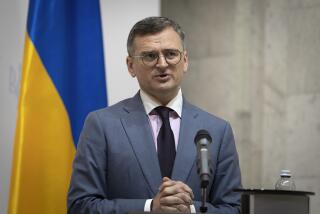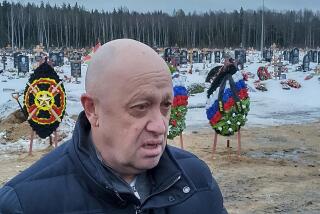Silencing a critical voice
- Share via
VLADIMIR V. PUTIN’S CHIEF economic advisor pulled no punches when he announced his resignation last week. Russia “has ceased to be politically free,” said Andrei Illarionov, whose competence is matched only by his candor. Illarionov will be missed, but at least he timed his parting shot for maximum impact.
Illarionov’s resignation came just days before Russia assumed leadership of the Group of 8 industrialized nations (it was scheduled to take over on Jan. 1) and amid discussion of its human rights and corruption records. Illarionov had been stripped of most of his duties but had been kept on staff as a symbol of the Putin government’s supposed tolerance for opposing viewpoints. His commentary was a rare example of criticism in an increasingly closed country.
As a critical voice in a government filled with Putin’s ex-KGB associates, Illarionov lambasted state takeovers of private companies, particularly the oil giant Yukos in 2004. Shortly afterward, he was dismissed as Russia’s envoy to the G-8. Last week, he drew unfavorable comparisons between his country and Saudi Arabia, accusing Russia of following the kingdom’s example of using energy reserves as a weapon in relations with other countries. Illarionov’s praise of Ukrainian President (and Putin rival) Viktor Yushchenko’s economic policies probably didn’t please anyone at the Kremlin either.
The timing of Illarionov’s departure has sharpened the focus on recent criticisms of Russia, and it will put extra pressure on the country during its first turn as head of the G-8. Evidence of Putin’s insularity and authoritarianism seems to grow by the day.
Last month, the corruption watchdog group Transparency International drew attention to Russia’s need to combat corruption in its own country during its G-8 presidency. Also in December, the Russian parliament passed a bill that would limit, if not shut down, the operations of many nongovernmental organizations. And a parliamentary investigation into the school hostage crisis in Beslan in 2004 is already facing criticism that its report, released last week, placed too much blame on local authorities and not enough on the federal government.
Illarionov’s departure may just create enough discomfort for Putin and his cohorts to give them some pause, however brief. If Russia’s fellow G-8 members keep up the pressure, then the pause may become something more lasting. If they don’t, and Putin fails to change his ways, then a sane and dissenting voice will be replaced by an uneasy silence.
More to Read
Sign up for Essential California
The most important California stories and recommendations in your inbox every morning.
You may occasionally receive promotional content from the Los Angeles Times.













